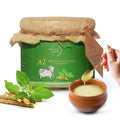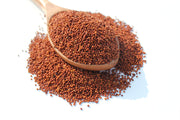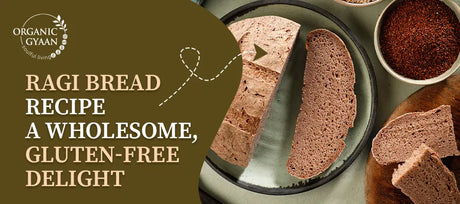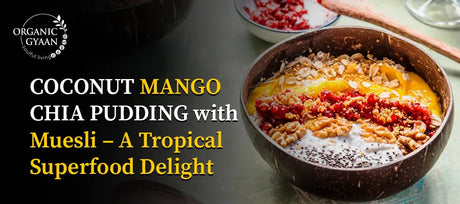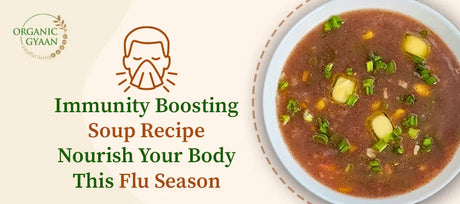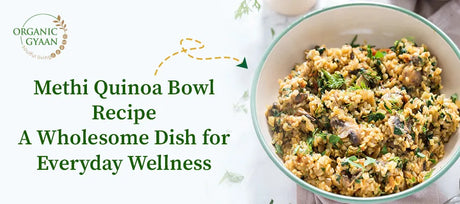Looking for a simple yet powerful way to upgrade your daily meals? Meet barley dalia, also known as jau daliya- a humble grain that packs a serious nutritional punch. With its soft, chewy texture and subtle nutty taste, barley dalia is not just delicious but incredibly good for your health. Whether you're starting your day with a warm bowl of porridge or adding it to lunch or dinner, this ancient grain fits right into your modern wellness routine.
Health Benefits of Barley Dalia
There’s a reason barley dalia has stood the test of time it’s packed with essential nutrients and health benefits that your body will thank you for:
-
Great for Digestion: Thanks to its high fiber content, barley dalia keeps your digestive system running smoothly and helps maintain gut health.
-
Keeps You Full Longer: Trying to manage your weight? This grain helps curb cravings by keeping you full and satisfied for longer.
-
Nutrient-Rich: A natural source of Vitamin B6, copper, magnesium, and phosphorus- all important for energy, bone strength, and overall wellness.
-
Supports Heart Health: The beta-glucans in jau daliya can help lower bad cholesterol levels and keep your heart happy.
-
Balances Blood Sugar: Perfect for diabetics or anyone looking to stabilize their energy throughout the day.
-
Boosts Immunity: Loaded with antioxidants and phytochemicals, it helps strengthen your immune system.
-
Good for Your Skin: The nutrient-dense profile of barley dalia contributes to healthier, glowing skin.
-
100% Natural: Free from chemicals, preservatives, and artificial additives- just the way nature intended.
-
Top Quality: We ensure hygienic processing to deliver fresh, clean grains straight to your kitchen.
When you enjoy a bowl of barley porridge, you’re not just filling up- you’re fueling up with real, nourishing food. These barley porridge benefits and jau dalia benefits make it a smart addition to your everyday diet.
How to Use Barley Dalia
One of the best things about barley dalia is how versatile it is. You can enjoy it in a variety of ways:
-
Make Comforting Meals: Try it in a simple khichdi or a colorful vegetable pulao- it soaks up flavors beautifully while adding texture and nutrition.
-
Prepare Barley Water: Just boil it with water and sip throughout the day. It’s light, cooling, and great for digestion.
-
Add to Soups and Stews: Drop a handful into your favorite soups or stews to make them heartier and more nourishing.
-
Start the Day Right: Use jau daliya to make wholesome breakfast recipes like upma, idli, or even a twist on dosa.
Why Choose Organic Gyaan’s Barley Dalia?
When it comes to your health, quality matters. Our barley dalia is carefully selected, hygienically processed, and 100% free from any harmful chemicals or additives. It’s as close to nature as it gets- fresh, clean, and full of goodness.
Whether you're looking to improve your digestion, manage weight, or just enjoy more wholesome meals, our barley dalia is here to help you on that journey. It's more than just food- it’s nourishment rooted in nature and tradition.
FAQ
1. What is barley porridge?
Barley porridge, or jau ka dalia, is a nutritious grain made from barley. It’s rich in fiber, vitamins, and minerals- perfect for a healthy diet.
2. What are the health benefits of barley porridge?
Barley porridge supports digestion, helps manage weight, may lower bad cholesterol, and helps control blood sugar levels.
3. Is barley porridge gluten-free?
No, barley porridge contains gluten, so it’s not suitable for those with gluten intolerance or celiac disease.
4. How can I use barley porridge in my meals?
You can cook barley porridge into khichdi or pulao, make barley water, or add it to soups and healthy breakfasts like upma or idli.
5. Is barley porridge chemical-free?
Yes, barley porridge is completely natural-free from chemicals, preservatives, and artificial colors.
6. Can barley porridge help with weight loss?
Definitely! The high fiber in barley porridge keeps you full longer, helping to reduce overeating and support weight loss.
7. How should I store barley porridge?
Store barley porridge in an airtight container in a cool, dry place, away from moisture.
8. Is it safe for diabetics?
Yes, barley porridge contains beta-glucans, which may help manage blood sugar- making it a good choice for diabetics.
9. Can children eat barley porridge?
Absolutely! Barley porridge is healthy and easy to digest for kids- great in porridge or soups.


















